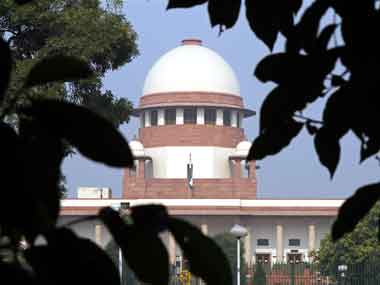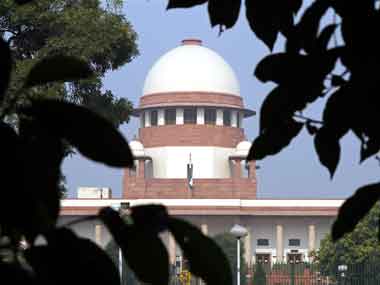The five-judge Supreme Court bench hearing petitions challenging the National Judicial Appointments Commission (NJAC) to select higher court judges appears to be treading a thin line between appearing neutral in the dispute while also protecting judicial independence. In hearings yesterday (29 April), the bench rightly observed that who is in the NJAC is less important than safeguarding the independence of the judiciary and the new law’s compliance with the basic structure of the constitution. [caption id=“attachment_2221130” align=“alignleft” width=“380”]  Supreme Court of India. Reuters[/caption] According to an Indian Express report, the bench observed: “There was a system (collegium) and we think it was good. The government felt that it needed to be replaced with something else. It is the choice of Parliament to make a system but that system has to be independent and compliant with the basic structure of the Constitution. The system is all right only if the government has done so. We then don’t care whether none of us in it or all of us in it.” The Express also paraphrased the bench as saying that it will examine the NJAC law’s “validity on the constitutional principles laid down by the Supreme Court to check the executive and its authority.” While no one will ever disagree with the point about ensuring judicial independence, there can be two or three problems with the way the bench seems to have formulated the basic issues involved. First, by saying that the court felt the collegium system was good, it betrayed some sense of what it was thinking. The bench cannot adjudicate fairly if its own inclinations are in one direction. One hopes this is not the case. Second, by specifying that it would look at the NJAC law based on the principles laid down by the Supreme Court itself, the bench may effectively avoid looking at its own inconsistencies in past cases involving this issue. The question is: will the bench also consider whether its own judgments, which created the collegium system in the 1990s, also contravened the constitution’s basic structure? Since the purpose of the NJAC was to end the collegium system, that question cannot be avoided. Third, the reference to checking the authority of the executive needs to be balanced by also placing checks on the Supreme Court’s ability to enter the executive’s domain. From chasing black money to directing criminal investigations to deciding how scarce national resources should be alienated, the Supreme Court has waded deep into executive territory. If courts are meant to check executive excesses, isn’t it equally important for the executive to seek a return of its powers, as laid down in the constitution? The fact is the constitutional validity of the collegium system is more open to question than the NJAC’s corrective. In a 1981 judgment, the Supreme Court had, in fact, asserted very clearly that the power to appoint judges lay solely with the president (ie, the government), subject only to the proviso that it will effectively consult the judiciary. However, as senior counsel TR Andhyarujina wrote in an article last year, in two subsequent judgments, the court, “professing to safeguard the independence of the judiciary, reversed the first verdict and rewrote the constitutional provisions to hold that the primacy in the appointment of a judge of the Supreme Court was with the CJI, who would make his recommendation to the president after consultation with two of his senior judges." In a later judgment, the court “diluted the primacy of the CJI and gave the power of appointment to a collegium of the CJI and four of his senior-most colleague.” The point is simple: can the Supreme Court overturn an explicit provision of the constitution and arrogate to itself the right to appoint judges without reference to the government? Can it interpret the law in a way where it is the beneficiary of the interpretation? Has not the Supreme Court itself breached the basic provisions of the constitution by doing so? Is there any country in the world where judges appoint themselves, with government doing just the typist’s job of notifying their decisions? The five-judge bench headed by Justice JS Khehar will do the top court’s own credibility a lot of good by accepting that the court has indeed breached the constitution in the pursuit of “judicial independence”. Whether the government also breached the constitution through the NJAC is another matter, which the court can certainly consider, but there is no doubt that the collegium system was a clear case of the judiciary extending its own constitutional mandate. It cannot be revived. The bench also needs to know that on NJAC, there is near complete unanimity in the political class that judges cannot appoint themselves. A discussion in the Rajya Sabha yesterday (29 April) should disabuse the judiciary of any illusions on this score. Legislators are clear that the judiciary has usurped their powers.
The SC bench which is examining the validity of the NJAC law should also look at whether its self-created collegium system had breached the constitution’s basic features and mandate
Advertisement
End of Article
Written by R Jagannathan
R Jagannathan is the Editor-in-Chief of Firstpost. see more


)

)
)
)
)
)
)
)
)



